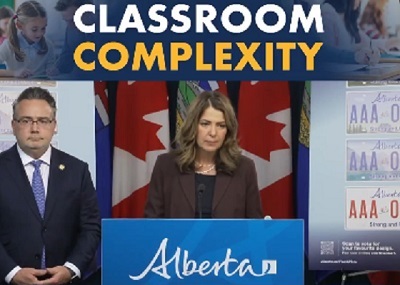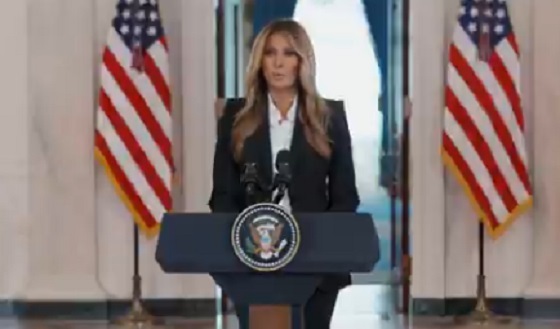Education
Too many bad ideas imposed on classroom teachers

From the Fraser Institute
The Waterloo Region District School Board recently announced it would remove garbage bins from classrooms, before suddenly reversing itself.
Strange as it sounds, the school board planned to replace classroom waste bins with larger bins in common areas outside of classrooms, ostensibly to reduce the amount of waste produced by schools. Apparently, the facilities superintendent and senior facilities manager (the people behind this idea) think garbage magically appears when garbage bins are in classrooms and disappears once you get rid of these bins.
Of course, reality is quite different. Students still must dispose of dirty Kleenex tissues, empty pens and used candy wrappers. The aborted plan gave students a ready-made excuse for extra hallway trips. To prevent this from happening, teachers would have to provide makeshift garbage bins of their own.
This is a prime example of administrators trying to impose impractical directives on teachers for the sake of virtue signalling. No doubt Waterloo school board officials wanted to be recognized as environmental leaders. Getting rid of garbage bins in classrooms is an easy and effortless way to look like you’re doing something good for the environment.
Indeed, teachers typically bear the brunt of bad ideas imposed on them from above. As another example, British Columbia K-9 teachers must now issue report cards with confusing descriptors such as “emerging” and “extending” rather than more easily understood letter grades such as A, B and C. A recent survey revealed that most parents find the new B.C. report cards hard to understand. While most had no trouble interpreting letter grades such as A, less than one-third could correctly identify what “emerging” and “extending” mean about a student’s progress.
While the B.C. Ministry of Education claims these new report cards are built on the expertise of classroom teachers, its own surveys found that 77 per cent of teachers were unhappy with the grading overhaul. Of course, their feedback was ignored by education bureaucrats, which means teachers must implement something most disagree with, and then bear the brunt of parental frustration.
And one can never forget the nonsensical “no-zero” policies imposed on teachers in every province, which prohibit teachers from giving a mark of zero when students fail to hand in assignments or docking marks for late assignments. The reasoning behind no-zero policies is that zeroes have too negative an impact on student grades.
Fortunately, no-zero policies have become less popular in Canadian schools, particularly after Edmonton physics teacher Lynden Dorval was fired for refusing to comply with his principal’s no-zeroes edict. Not only did the public overwhelmingly support Dorval at the time, but the Alberta Court of Appeal upheld an arbitrator’s ruling that Dorval’s firing was unjust. In the end, taxpayers were on the hook for paying Dorval two years of salary, along with topping up his pension. But this doesn’t mean no-zero policies have disappeared entirely. Plenty of assessment gurus hired by school boards still push them on gullible administrators and unsuspecting teachers.
Finally, there are the never-ending diversity, equity and inclusion (DEI) training sessions—possibly the worst fads ever imposed on Canadian teachers. In an obvious desire to justify their jobs, DEI consultants provide many hours of professional development to hapless teachers who have no choice but to attend.
When teachers push back, as Toronto principal Richard Bilkszto did during a DEI session a couple years ago, they’re subjected to harassment and derision. In this case, the social impact on Bilkszto was so negative he eventually and tragically took his own life.
The Bilkszto case had a chilling effect—teachers should go along with whatever they’re told to do by their employer, even when a directive doesn’t make sense. This is not healthy for any profession, and it certainly doesn’t benefit students.
Classroom teachers have far too many bad ideas imposed on them. Instead of making teachers implement useless fads, we should just let them teach. That is, after all, why they became teachers in the first place.
Author:
Alberta
Diploma Exams Affected: No school Monday as ATA rejects offer of enhanced mediation

Premier Danielle Smith, Minister of Finance Nate Horner, and Minister of Education Demetrios Nicolaides issued the following statement.
“Yesterday, the Provincial Bargaining and Compensation Office wrote to the Alberta Teachers’ Association (ATA) and formally requested an agreement to enter an enhanced mediation process.
“This process would have ensured that students returned to the classrooms on Monday, and that teachers returned to work.
“Negotiating would have continued with the ATA, Teachers’ Employer Bargaining Association (TEBA) and a third-party mediator to propose a recommended agreement.
“We are very disappointed that the Alberta Teachers’ Association refused this offer. Teachers and students should also be disappointed.
“PBCO made this offer to the ATA because the union has not made a reasonable offer and this strike is impacting students. Alberta’s government is trying to put kids first and bring an end to this strike.
“The offer of enhanced mediation provided a clear path to ending it.
“We want the same things as the ATA: More teachers. More pay for teachers. More educational assistants. And more classrooms.
“This strike has gone on too long and we are extremely concerned about the impact it is having on students.
“We are willing to consider further options to ensure that our next generation gets the world-class education they deserve. After about three weeks, a strike of this nature would reach the threshold of causing irreparable harm to our students’ education.
“The ATA needs to do what is right for its members, and for all Alberta students.
“If it refuses to do so, we will consider further options to bring this strike to an end.”
Diploma exam update
November diploma exams will be optional for students.
With instructional time in schools disrupted due to the teacher strike, the November 2025 diploma exams will now be optional for students. Students who wish to write a diploma exam may request to do so, and their school boards will accommodate the request.
The optional diploma exams apply to all schools provincewide. These exams will still take place on the currently scheduled dates.
Students who choose not to write the November diploma exams can still complete their courses and graduate on time. Their final grade will be based entirely on the school-awarded mark provided by their teacher.
Choosing not to write the November diploma exams will not affect a student’s ability to apply to, be accepted by, or attend post-secondary institutions after graduation.
No changes have been made to the January and June diplomas and provincial achievement tests.
Quick facts
- Students are automatically exempted from writing the November diploma exams but can request to write them.
- School boards must allow the student to write the diploma exam if requested.
Alberta
Premier Smith addresses the most important issue facing Alberta teachers: Classroom Complexity

Premier Danielle Smith is posting this response to a media question about Classroom Complexity.
While Albertans are hearing a lot about capping class sizes, Premier Smith says it might be a much better idea to talk about capping “complexity”.
The challenges teachers face in today’s classrooms are recognized, and work continues toward practical solutions that address their concerns.
Achieving a fair and reasonable agreement that best supports students remains a top priority. pic.twitter.com/o4UCt7sDoU
— Danielle Smith (@ABDanielleSmith) October 16, 2025
-

 International2 days ago
International2 days agoPoland’s president signs new zero income tax law for parents with two children
-

 Business1 day ago
Business1 day agoFord’s Whisky War
-

 International2 days ago
International2 days agoAustralian territory bans men from women’s prisons in national first
-

 National2 days ago
National2 days agoPoilievre accuses Canada’s top police force of ‘covering up’ alleged Trudeau crimes
-

 Agriculture6 hours ago
Agriculture6 hours agoIs the CFIA a Rogue Agency or Just Taking Orders from a Rogue Federal Government?
-

 COVID-192 days ago
COVID-192 days agoFreedom Convoy leader Tamara Lich says ‘I am not to leave the house’ while serving sentence
-

 Focal Points1 day ago
Focal Points1 day agoTrump Walks Back His Tomahawk Tease from Zelensky
-

 Red Deer14 hours ago
Red Deer14 hours agoYour last minute election prep: Common Sense Red Deer talks to the candidates







